The Madison Redux
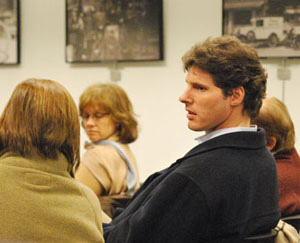
Carsten Hohnke, who represents Ward 5 on Ann Arbor city council, attended Tuesday evening's meeting about The Madison. In the background is Laurie Blakeney, owner of the Ann Arbor School of Yoga and the mother of Newcombe Clark, who's a partner in The Madison project.
Many of the 15 or so people gathered in the downtown Ann Arbor library on Tuesday night were clearly neighbors. There were handshakes, waves, nods of greetings and, in at least one case, the delivery of a Christmas gift. And as the meeting unfolded, it also became clear that these people had another common bond: Opposition, or at least strong skepticism, to a revived apartment project called The Madison.
Developer Jeff Helminski and Newcombe Clark of Bluestone Realty plan to resubmit a scaled-down version of The Madison to the city on Dec. 29, and were holding this meeting to tell neighbors about their new plans and to get feedback on the project. Located on East Madison between South Fourth and Fifth avenues, the original proposal called for a 14-story building with 161 units. This new one has four stories, with 60 units.
That’s still too large for some.
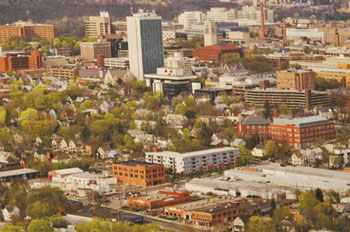
The Madison is the white L-shaped building in roughly the center of this rendering. (image links to higher resolution file)
The Madison
The apartment complex is proposed to be built on a site that now covers eight parcels of land. On seven of those parcels stand single-family houses that have been converted into multi-unit student rentals – Helminski describes the conditions of those houses as in “pretty rough shape.” One lot has an industrial building on it. The site is across the street from Fingerle Lumber.
The Madison in its scaled-down version would have 60 apartments and a total of 161 bedrooms, with the following breakdown of sizes and estimated rents: 9 one-bedroom units ($1,250/month), 8 two-bedroom units ($2,000/mo.), 36 three-bedroom units ($2,700/mo.), and 7 four-bedroom units ($3,200/mo.). The project will propose that 15% of the units be designated as affordable housing. That will include all nine of the one-bedroom units, with a cap of about $700/month in rent.
There would be parking in an underground level and small surface lot, but those spots would be rented separately from the apartments, at about $135 per month for a space.
Helminski will be seeking a planned unit development (PUD) designation for the site. The site currently is zoned as a combination of industrial and R4C, a designation for multiple family dwellings.
What defines a neighborhood?
An issue that residents raised in a variety of ways hinged on how they defined the neighborhood, and whether The Madison was a good fit within that definition.
Helminski described the apartment complex as a buffer between encroachment by commercial developments to the south and the residential neighborhood to the north. But several people voiced concern that tearing down older homes – even houses that had been sliced up into student rentals – would degrade the stability of the area, and would encourage other developers to do the same. One person characterized it as akin to moving smokers into a non-smoking section.
Ray Detter, chair of the Downtown Area Citizens Advisory Council, said they were proposing to tear down a greater amount of affordable housing – referring to the roughly 36 bedrooms provided in the existing student rentals – and replace it with only nine units of affordable housing. Why build something with less affordable housing than already existed on that site? Helminski countered that the existing units were affordable only because they were substandard housing. “I wouldn’t choose to live there, let’s put it that way,” he said.
Detter’s main concern was that the project didn’t conform to the city’s Central Area Plan, which emphasizes the preservation of existing neighborhoods. It’s not downtown, he argued, because it’s located outside the boundaries of the Downtown Development Authority (DDA).
It’s unfortunate, he said, that the neighborhood wasn’t made into an historic district. It falls into the boundaries that were proposed for a study group to examine forming a Germantown historic district, but city council recently shot down that proposal.
Detter said he was similarly unhappy with other projects being proposed, including City Place, an apartment complex planned along South Fifth Avenue. (He didn’t mention it at Tuesday’s meeting, but he’s also dissatisfied with a proposed UM expansion in the Wall Street area, and attended a recent neighborhood meeting to raise concerns that development, too.)
Helminski disagreed, saying the project did conform with the Central Area plan and that it was preserving the neighborhood. He said the neighborhood was more than just the residential houses to the north. It also included Fingerle Lumber to the south, the former Perry School to the east (now used by the University of Michigan), the Thomson Street parking structure and other non-residential buildings. And he does consider it as being downtown, because it’s just one block east of Main Street and a few blocks south of the core business district.
Newcombe Clark weighed in, saying the definition of a neighborhood is very subjective, and that they don’t believe this project is destructive. He contended that the complex will add to the neighborhood’s vibrancy by bringing more people to live, shop, work and be a part of the community.
One resident argued that she wasn’t opposed to an apartment building, but she just didn’t want one that was taller than 2.5 stories, which she felt would be a better fit for the surrounding neighborhood. Clark said The Madison wouldn’t be financially viable if they cut the number of floors. “This is the project that can be built,” he said.
Students or young professionals?
Clark and Helminski say their target market for The Madison is young professionals – people in their 20s and 30s who want to live in an urban setting, but who can’t afford the higher-end apartments and condos that dominate today’s housing stock in downtown Ann Arbor.
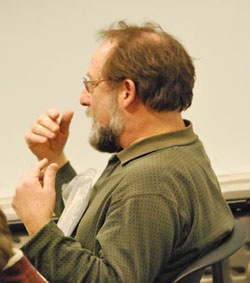
Walter Spiller, a 40-year resident who also owns student rental properties in the neighborhood where The Madison is being proposed.
But most people attending Tuesday’s meeting believed the apartments were more likely to attract UM students, and were concerned about the implications of that. Walter Spiller, a resident who also owns rental properties in that neighborhood, said that apartment buildings in Ann Arbor with four-bedroom units inevitably rent to students. He noted that the kind of young professionals described as The Madison’s target market simply wouldn’t want to live with roommates – they’d be ready for their own place. But the majority of The Madison’s units had three or four bedrooms.
Helminski countered by saying he knows of people who prefer to live in urban areas but can’t afford to do it alone, so they share an apartment. He said the location of The Madison would make it desirable for people who work downtown and want access to the city without commuting. (Earlier in the meeting Clark said they were working with AATA to try to get bus passes for residents of The Madison.)
Someone asked if they’d be leasing individual bedrooms rather than the entire apartment. That’s a strategy being used at 411 Lofts, a new apartment complex at the corner of Division and Washington. Helminski said they would lease individual bedrooms if that’s what people wanted. Another resident asked how they’d prevent people from “doubling up” in the bedrooms. Clark said they wouldn’t lease a bedroom to two people, but he acknowledged that they had no control over whether it might happen.
Spiller talked about the transient nature of most student renters. He said the neighborhood is like a teeter totter (a reference that naturally pleased some of the The Chronicle’s staff), and that it depended on a delicate balance of diverse people to create stability. “When it tips to students,” he said, “the neighborhood falls apart.” He pointed to the Vaughn Street area as an example of a neighborhood that’s become a “prototypical student ghetto.”
Helminski said they believe their project helps maintain that balance, by offering a place that young professionals are likely to find desirable. Clark said they couldn’t discriminate against students, and said that if students rented there, they’d also contribute to the vibrancy of the neighborhood. Helminski took issue when someone referred to the project as a dormitory, and said that people have it in their head that it will be rented primarily by students. “Of course it will!” came the response from several in the room.
Next steps
Helminski said they’d be submitting a new set of plans to the city on Dec. 29 and would work with city staff before taking it to the Planning Commission, likely in February or March. The project would eventually require approval by city council. Helminski said that The Madison would take about 14 months to build, so if it’s approved sometime in 2009, the complex would likely be ready to open in 2010 or 2011.
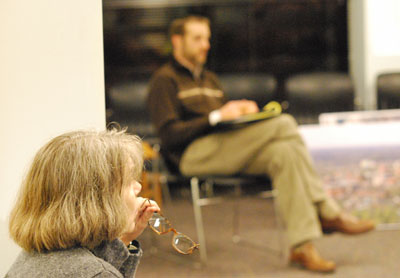
Resident Kathy Boris listens to the discussion. In the background is developer Jeff Helminski of Moravian Cos.




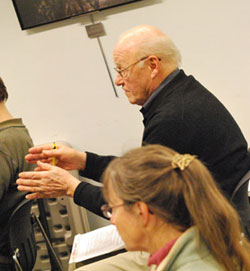
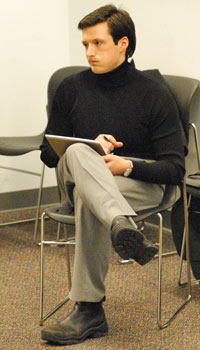
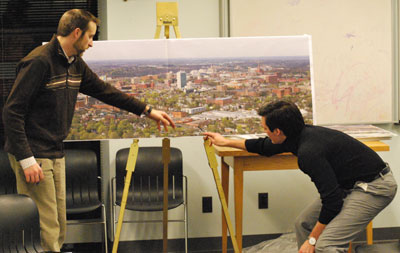
Student housing should be built on North Campus, the last under-used property in Ann Arbor. Protecting the older “Charm Zone” neighborhoods is key to Ann Arbor’s long-term vibrancy.